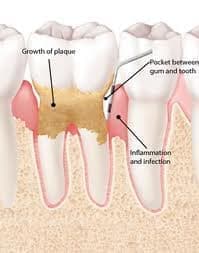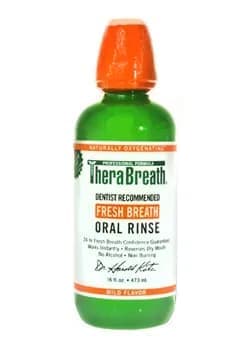The human tooth is the only part of the body that does not contain some type of regulating system that sheds unnecessary or dead surfaces. As a result, vast colonies of microorganisms tenaciously adhere to each tooth's exterior, consuming mouth debris, reproducing and continuously adding to this biofilm. Although this dental plaque film is thought to be a part of an oral defense mechanism that is intended to prevent seriously pathogenic bacteria from rapidly destroying tooth enamel, plaque will cause dental and gum disease as well as bad breath when low pH levels and chronic dryness exist within the mouth. Poor oral hygiene also exacerbates the problem of dental plague.
The Oral Microbiome
The mouth is often referred to as an oral "microbiome" due to the variable environmental conditions it is capable of presenting that are conducive to bacterial growth. Scientists have estimated that up to 25,000 different types of bacteria can live in the mouth under certain chemically diverse circumstances. Over 1,000 of these bacterial species live in the dental plaque ecosystem as microorganisms that are extremely adaptable to changing mouth environments. In fact, research has shown that oral bacteria can alter environmental conditions by participating in complex biotic relationships.
What is Plaque?
 Plaque consists of extracellular matrix (tissues) and microorganisms, specifically anaerobic bacteria (actinobacteria and fusobacterium) and Streptococcus mutans. Tissue material involved in plaque production contains lipids, proteins and long-chain polysaccharides. Normally, naturally formed plaque is harmless and is beneficial in preventing harmful microorganisms from attacking teeth and gums. However, when plaque is allowed to harden due to not brushing every day, it begins to thicken, developing layers that become more difficult to remove as time goes by.
Plaque consists of extracellular matrix (tissues) and microorganisms, specifically anaerobic bacteria (actinobacteria and fusobacterium) and Streptococcus mutans. Tissue material involved in plaque production contains lipids, proteins and long-chain polysaccharides. Normally, naturally formed plaque is harmless and is beneficial in preventing harmful microorganisms from attacking teeth and gums. However, when plaque is allowed to harden due to not brushing every day, it begins to thicken, developing layers that become more difficult to remove as time goes by.
Bacteria that lie closest to a tooth's surface will start using anaerobic respiration as a means to survive, which increases the number of acids excreted by the bacteria. This type of bacterial "breathing" uses electron acceptors rather than oxygen, which explains why anaerobic bacteria are the main reason for severe bad breath emanating from a mouth that experiences xerostomia, or dry mouth syndrome. Furthermore, acids released from bacteria that inevitably cause dental plaque contributes to demineralization of nearby teeth.
How and Why Dental Plaque Forms
Mechanisms involved in plaque formation consist of:
- Bacteria and protein absorption forming biofilm over tooth enamel
- A condition produced by electrostatic forces and the van der Waals effect causes teeth to experience "reversible adhesion". Alternately, "irreversible adhesion" is the result of molecules interacting among the pellicles (a supportive cell membrane) and cell surfaces
- The amount of initial bacterial colonizers augmented with secondary bacterial colonizers cause reproduction and the generation of biofilm.
Dental plaque tends to accumulate when factors related to saliva flow, pH level, temperature of the mouth and redox reactions combined with unsatisfactory oral hygiene practices allow plaque to harden on the surfaces of the teeth, especially between teeth. Redox (reduction and oxidation) reactions affect pH levels in the mouth because they exhibit properties similar to acid-base reactions.
The Importance of Saliva in Preventing Dental Plaque and Bad Breath
Regulated by the hypothalamus gland, saliva is one of the most underestimated substances produced by the body in regards to maintaining overall health. A sufficient amount of saliva is necessary to:
- Alleviate destructive bacteria that enter the body through the mouth before it can reach the bloodstream
- Aid in the digestion process by initializing food breakdown using enzymes before it enters the stomach
- Help in neutralizing oral acids
- Maintain adequate moisture in membranes involved with smell and taste
- Inhibit tooth decay by continuously cleaning the mouth, removing cariogenic carbohydrates and negate the abrasive effects of lactic acid
- Impart beneficial chemicals to the mouth such as lactoferrin (protein) and mucin. A glycoprotein responsible for saliva's hydrating qualities, mucin allows saliva to keep membranes optimally moistened
- Enhance the immune system by providing an antibody called IgA
In addition, saliva also prevents the mouth from becoming stagnant and anaerobic, i.e., without oxygen. This is why dry mouth syndrome is such a vital factor in the development of halitosis, dental plaque and other oral diseases.
Video on How Plaque is Detected
What is Tartar?
Tartar, or calculus, is the advanced form of dental plaque. It is the result of a long and continuous accumulation of plaque that has been allowed to remain on and in between teeth due to poor oral hygiene methods. Tartar has a rough, almost pitted surface that facilitates the adherence of additional layers of plaque bacteria, which can and often does lead to serious periodontal issues.
While plaque can be removed by flossing and brushing, tartar needs professional attention by a dentist using specialized instruments. Individuals with tartar buildup usually experience inflamed gums and cavities that contribute to an existing condition of bad breath.
How to Prevent Dental Plaque and Tartar Buildup
 Practicing good oral hygiene habits and reducing the amount of starchy, sugary foods and beverages consumed will inhibit the formation of dental plaque. Brushing after meals is suggested for people who suffer from medical conditions such as diabetes or xerostomia, which are conducive to gum and teeth diseases. Flossing in the morning and evening is also advised to remove any food particles missed during brushing.
Practicing good oral hygiene habits and reducing the amount of starchy, sugary foods and beverages consumed will inhibit the formation of dental plaque. Brushing after meals is suggested for people who suffer from medical conditions such as diabetes or xerostomia, which are conducive to gum and teeth diseases. Flossing in the morning and evening is also advised to remove any food particles missed during brushing.
Using non-alcoholic, antibacterial mouthwashes such as TheraBreath's brand of mouthwash will further provide effective protection against plaque and tartar buildup. TheraBreath mouthwashes, sprays and rinses do not contain alcohol like most heavily advertised brands of mouthwash do and thus will not contribute to a dry mouth. Alcohol is a known desiccant and diuretic, substantially reducing body fluid levels and interfering with salivary gland functioning. When customers use TheraBreath mouthwash, they are providing their mouths with a fresh, natural, oxygenating solution that eliminates anaerobic bacteria and enhances saliva flow. Dental plaque does not have a chance to accumulate on teeth when faced with the powerful ingredients in TheraBreath mouthwash. Moreover, breath remains clean and odor-free throughout the day due to the elimination of harmful, sulfurous bacteria.
Health Effects of Untreated Plaque
Scientists researching the health consequences of untreated dental plaque have discovered that oral health practices directly influence the potential development of cardiovascular disease. When periodontitis impacts teeth and gum health, bacteria associated with dental plaque are capable of disseminating throughout the bloodstream and into the vascular endothelium. As a result, an increase in the risk of experiencing atherosclerosis, myocardial infraction and myocardial ischemia occurs, health events that are often preceded by serious thromboembolic conditions. In fact, studies involving platelet aggregation, an event common to various heart diseases, has been shown to be facilitated by plaque bacteria (Annals of Periodontology, 1998, July, volume three issue, pp. 151-160).
Avoid the consequences of plaque and tartar by brushing twice a day, flossing and using TheraBreath oral hygiene products specially formulated to eliminate anaerobic bacterial growth, enhance saliva flow, prevent destructive plaque from forming on teeth and providing users with the freshest breath they have ever experienced.
